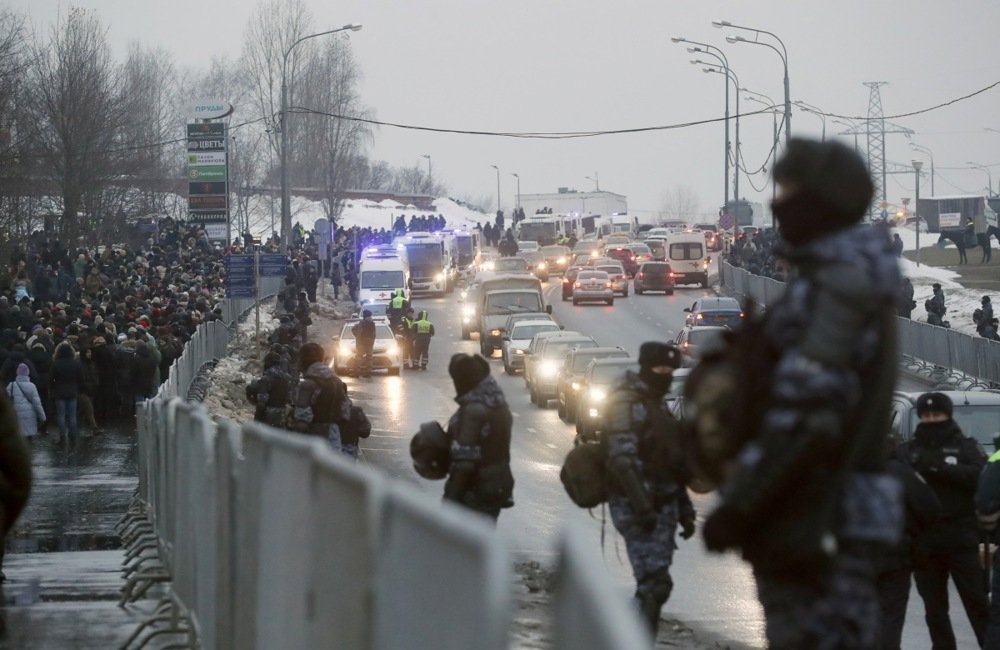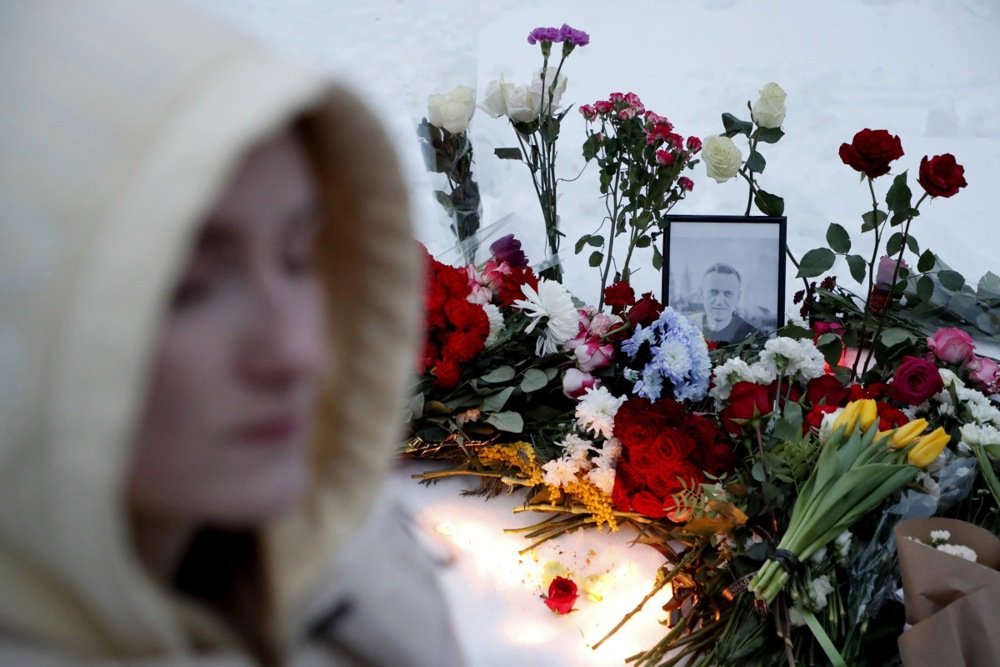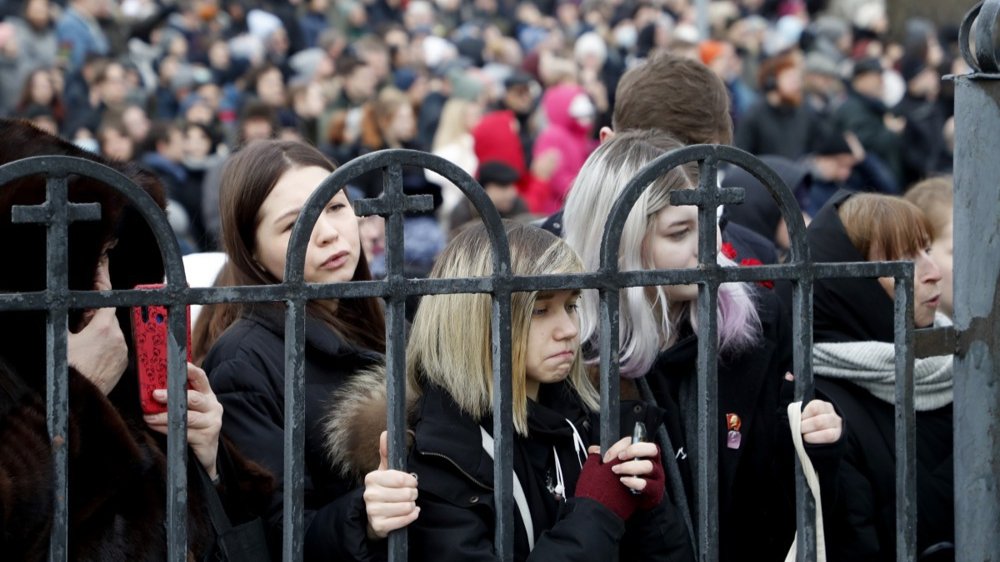Thousands turned out in Moscow last Friday to honour the murdered Russian opposition leader Alexey Navalny on the day of his funeral, undeterred by the heavy police presence around the church and cemetery. Some even packed a change of clothes and left their phones at home in case they got detained.
In total, over 16,000 people came to bid their final farewell to Navalny, at least 16 of whom were arrested. In total, over 110 people were arrested nationwide in 23 different cities for attending memorial events, according to human rights project OVD-Info.
Novaya Europe spoke to those who stood in the line stretching over 2 kilometres to visit Navalny’s grave despite fully understanding the risk they were placing themselves in.
No more fear
“For me, it was far more important to be there on the day of the funeral than to be safe at home,” said Yekaterina, adding that no one had been sure whether the funeral would end in mass detentions or not, but went along anyway. “I took a charged power bank and water with me. And I always carry my passport. Mobile internet stopped working at once, although calls still went through.”
“I think most of those who came understood that even if there would be no detentions that day, there were no guarantees that they wouldn’t be detained in the future,” Yekaterina said, referring to facial recognition technology actively used by Russian law enforcement to detain people using CCTV and video footage. “They might detain you in the metro or come to your house later.”
The cemetery had a CCTV camera installed in plain sight, Yekaterina recalled.
“Most of those who came to the funeral understood what threat that could pose,”
she said. “But I had a feeling that even if someone was scared at first, that fear disappeared somewhere on the way to the cemetery. We saw that there were a lot of us. People began chanting ‘No to war’, ‘Putin is a murderer’, ‘Russia will be free’.”

Police officers standing guard as Muscovites lined up to pay their respects to Alexey Navalny. Photo: EPA-EFE/MAXIM SHIPENKOV
Flowers in the air
“I didn’t even consider not going,” says Natalia. “The actual question was why we didn’t take to the streets before and block the path for police vans at the prison entrances. It’s too late to do any of that now.”
Natalia said she didn’t bring her phone fearing the police could check her messages.
“I told my mum where she should call if I got detained.”
At first, Natalia said, she wasn’t worried about the police. “I’m not afraid of them. What can they do to me? Take me to a police station? Fine me? Ok, I’ll pay the fine, but I’ll still go wherever I want whenever I want.”
“But when we got there, I did get a bit scared. When you see those empty eyes in balaclavas, these huge figures in full combat gear, the police vans … you realise how fragile you really are, and how quickly they could put you away if they needed to.”
“But when we were all walking together and chanting slogans, holding up the flowers we were carrying in the air, something inside of me awoke. I don’t know how to describe what I felt, but it was like you’re in a lot of pain but you’re no longer afraid,” Natalia recalled.
Socks and crackers
“I had a shoulder bag with me, like the one postmen wear,” Olga recalled. “The most important things inside were my passport and the copy of my child’s birth certificate.”
Olga also brought some food with her — a pack of nuts, water, and some crackers — in case she found herself in the back of a police van. After a while, she decided to share it all with the other people standing in line. “I also had a second pair of socks, which came in handy after eight hours of queuing. I brought a good power bank and a cable, and made sure my phone was password-protected, though it wouldn’t do much if I got arrested.” Olga also brought a bag of toiletries and her medication.
She also brought a mask that she didn’t end up using, even though wearing one would have lessened the risk of being identified by cameras. “But it didn’t feel right to be wearing a mask if everyone around me wasn’t,” Olga said.
“After the funeral, I got myself a go bag, just in case. You never know what could happen.”

A makeshift memorial to Alexey Navalny near the cemetery where he was buried. Photo: EPA-EFE/MAXIM SHIPENKOV
Glitter and perfume
Before going to the funeral, Anna packed a bag with everything she might need in case she got detained. “I even brought Florian Illies’ book Love in a Time of Hate. It’s quite long, but I thought that I’d have a lot of time to read should I get detained for a day. I also brought a toothbrush, warm socks and underwear.”
Like many others, Anna packed some food and water in case she or her friends got arrested. “It’s sometimes difficult to receive packages in jail.” Anna also had her laptop with her to do some work, as she spent all of Friday standing in line.
“I also brought glitter! Glitter and perfume. I thought they would keep me going and stop me from going crazy in an enclosed space.”
“Fortunately, I didn’t need to use any of this stuff. But I don’t regret bringing it,” Anna said. “When I was on my way to the funeral, I felt very tense. I had a feeling I would get arrested after all. Thank God, it didn’t happen, but I still felt like I was in danger for most of the day.”
Join us in rebuilding Novaya Gazeta Europe
The Russian government has banned independent media. We were forced to leave our country in order to keep doing our job, telling our readers about what is going on Russia, Ukraine and Europe.
We will continue fighting against warfare and dictatorship. We believe that freedom of speech is the most efficient antidote against tyranny. Support us financially to help us fight for peace and freedom.
By clicking the Support button, you agree to the processing of your personal data.
To cancel a regular donation, please write to [email protected]

